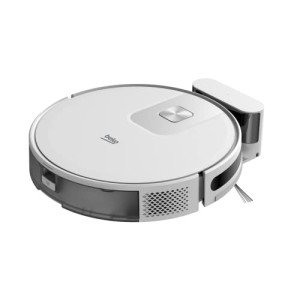There's Enough! 15 Things About Autonomous Vacuum We're Tired Of Hearing
The Rise of Autonomous Vacuums: Revolutionizing Home Cleaning
In the age of innovation, home tasks are becoming significantly automated, and one of the most significant improvements in this world is the autonomous vacuum. These smart cleaning robotics are created to minimize the drudgery of traditional vacuuming, making them popular among time-strapped households. This short article explores the advancement, functionality, advantages, and restrictions of autonomous vacuums, along with a comparison of some of the leading models on the marketplace today.
What is an Autonomous Vacuum?
An autonomous vacuum, likewise called a robotic vacuum cleaner, is a little, automatic gadget that navigates through your home to tidy floors without human intervention. Geared up with mop and vacuum robot , cams, and advanced software, these vacuums can detect obstacles, prevent stairs, and optimize cleaning courses. They normally operate from a rechargeable battery, going back to their charging stations when their power is low or when cleaning tasks are finished.
Key Features of Autonomous Vacuums
Smart Navigation:
- Utilizes sensors and algorithms to map the environment.
- Can navigate complicated layouts and avoid challenges.
Scheduling:
- Allows users to set cleaning times.
- Can operate when your house is empty, guaranteeing very little disruption.
Connection:
- Many designs connect to Wi-Fi, allowing for app control and integration with smart home systems.
- Users can customize settings, check cleaning status, and get alerts through mobile applications.
Suction Power:
- Varies in between designs; some deal adjustable suction settings for different floor types.
- High-end models include powerful suction capable of getting family pet hair and deep dirt.
Floor Type Adaptability:
- Capable of cleaning carpets, hardwood, tiles, and more.
- Specific models concentrate on tailored cleaning for multiple surface areas.
The Advantages of Using Autonomous Vacuums
1. Time-Saving
Among the most considerable advantages of autonomous vacuums is the amount of time they conserve. Rather than investing hours pressing a standard vacuum, house owners can set robotic vacuums to clean while they are participated in other activities.
2. Consistent Cleaning Schedule
With the ability to schedule cleansings, these vacuums ensure that areas are regularly cleaned, causing a cleaner home overall. Regular cleaning helps keep indoor air quality, specifically for households with allergies or asthma.
3. Smart Home Integration
Numerous autonomous vacuums can be integrated with smart home systems for smooth operation. Property owners can manage their vacuums via voice commands through gadgets like Amazon Alexa or Google Assistant, enhancing user benefit.
4. Compact Design
The slim profile of these devices allows them to clean up under furniture, such as sofas and beds, where standard vacuums frequently can not reach.
5. Pet-Friendly
For animal owners, autonomous vacuums can be a game-changer, as they are often geared up with specialized functions for getting pet hair and dander, adding to a cleaner home environment.
Limitations of Autonomous Vacuums
Despite their numerous benefits, autonomous vacuums likewise have constraints:
1. Minimal Deep Cleaning
While these vacuums effectively keep cleanliness, they might not change the effectiveness of a deep clean provided by traditional vacuums, particularly for heavily stained areas.
2. Capability Constraints
Many autonomous vacuums included small dust bins that need to be emptied regularly, specifically in larger homes or homes with family pets. This can be a trouble for some users.
3. Navigation Challenges
Although navigation technology is constantly enhancing, some models might have problem with particular designs, particularly complex spaces with many obstacles or very little rooms.
4. Rate Point
While prices have actually become more accessible, high-end models can still be rather pricey, presenting a barrier for some consumers.
Contrast of Top Autonomous Vacuum Models
Design
Smart Features
Battery Life
Suction Strength
Price Range
iRobot Roomba 980
App Control, Voice Assistant
120 minutes
1700 Pa
₤ 700 – ₤ 900
Roborock S6 MaxV
Advanced Mapping, Connectable
180 minutes
2500 Pa
₤ 600 – ₤ 800
Ecovacs Deebot Ozmo
Mopping, Smart Home
110 minutes
1500 Pa
₤ 450 – ₤ 700
Neato Botvac D7
Laser Navigation, Custom Zones
120 minutes
2000 Pa
₤ 800 – ₤ 900
Shark IQ Robot
Self-Emptying Base, Smart Map
90 minutes
1500 Pa
₤ 400 – ₤ 600
Significant Takeaways
- Smart Features: Consumers must focus on models offering robust smart features for benefit and efficiency.
- Battery Life: A longer battery life is beneficial for bigger home.
- Suction Strength: Depending on family needs, differing suction power can significantly impact cleaning effectiveness.
Frequently Asked Questions about Autonomous Vacuums
Q1: How do I keep my autonomous vacuum?
A: Regular maintenance consists of cleaning the brushes, clearing the dustbin, and inspecting for clogs. Furthermore, keeping the sensors clean up will help keep navigation accuracy.
Q2: Can robotic vacuums clean carpets and carpets?
A: Yes, numerous robotic vacuums are designed to effectively clean both hard surfaces and carpets. However, suction power might vary based upon the design.
Q3: Do robotic vacuums require Wi-Fi?
A: While numerous autonomous vacuums gain from Wi-Fi connection for app control and updates, some models can run individually without a cordless connection.
Q4: How frequently should I run my robotic vacuum?
A: It depends on your living circumstance, but running it a number of times a week is often recommended, particularly for homes with animals.
In conclusion, autonomous vacuums represent a significant development in home cleaning technology, promising convenience and performance. While mop and vacuum robot might not completely replace traditional vacuum cleaners, they are undoubtedly valuable in preserving a clean living environment. As innovation continues to develop, the future of home cleaning looks promising, and these devices are at the forefront of the transformation.
